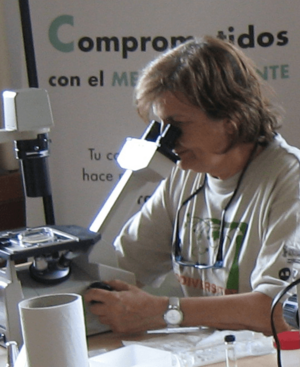Maria Rosa Miracle Solé facts for kids
Maria Rosa Miracle Solé (born June 2, 1945, in Barcelona, Spain – died May 28, 2017) was a very important Spanish biologist. She was a professor of Ecology at the University of Valencia. Dr. Miracle studied living things in water, like tiny plants and animals. She was also the first woman in Spain to become a full professor of Ecology!
Contents
Life and Education
Maria Rosa Miracle was born in Barcelona on June 2, 1945. She loved studying living things. She went to the University of Barcelona to study biology. In 1974, she earned her PhD in ecology. Her teacher was a famous ecologist named Ramon Margalef.
During her studies, she spent two years in the United States. She worked at the University of California. After finishing her PhD, she taught at the University of Barcelona. Then, in 1979, she moved to the University of Valencia. There, she started a research group. This group focused on studying freshwater environments.
A Pioneer in Ecology
In 1981, Maria Rosa Miracle made history. She became the first woman in Spain to be a full professor of Ecology. This was a big step for women in science. She was a leading expert in limnology. Limnology is the study of fresh water. From 1993 to 2002, she led the Iberian Limnology Association. She retired in 2015 but kept working as an emeritus professor. She passed away on May 28, 2017.
What She Studied
Maria Rosa Miracle studied many different things about water. She looked at the variety of life in water, called biodiversity. She also studied how living things interact with their watery homes. This is called ecology. She was interested in how to group and name aquatic organisms, which is taxonomy. She also studied where different water creatures live around the world. This is called biogeography.
Aquatic Life and Ecosystems
She studied tiny creatures like bacteria and plankton. Plankton are small plants and animals that float in water. She also looked at animals living on the bottom of lakes and rivers, called benthos. Dr. Miracle researched how these tiny creatures move up and down in the water. She also studied how aquatic ecosystems work. She even looked at old lake sediments to learn about past environments. This is called paleolimnology. She also studied how global change affects water.
Helping the Environment
Maria Rosa Miracle also worked on real-world problems. She studied eutrophication, which is when too many nutrients pollute water. She researched water pollution and how toxic substances affect water life. This is called ecotoxicology. Her work helped protect and manage aquatic environments.
New Discoveries
Dr. Miracle loved working with other scientists. Her interest in water animals led to new discoveries. Some new species were even named after her! For example, a tiny creature called Anuraeopsis miracleae was named in her honor. Another small animal, a copepod, was named Eucyclops miracleae.
She wrote almost 200 articles for science journals. She also wrote or helped write many books. She guided more than 20 students who were getting their PhDs. Her first science article was about tiny animals in Lake Banyoles. Her research helped us understand the ecology and biodiversity of water life. She also enjoyed sharing science with everyone. She wrote popular articles and books to explain ecology to a wider audience.
Awards and Recognition
Maria Rosa Miracle's work was highly respected. The Iberian Association of Limnology honored her in 2016. They held a special meeting to celebrate her scientific journey. Also, a science journal called Limnetica dedicated two special issues to her amazing contributions.
See also
 In Spanish: Maria Rosa Miracle para niños
In Spanish: Maria Rosa Miracle para niños
 | Georgia Louise Harris Brown |
 | Julian Abele |
 | Norma Merrick Sklarek |
 | William Sidney Pittman |


